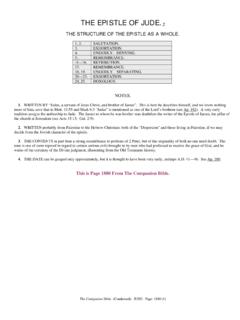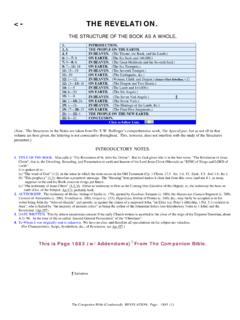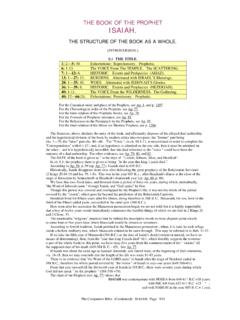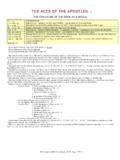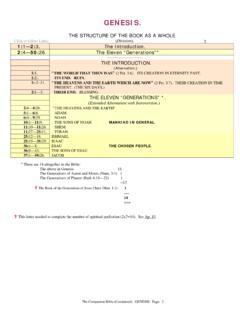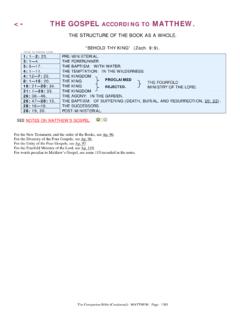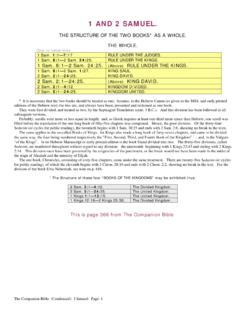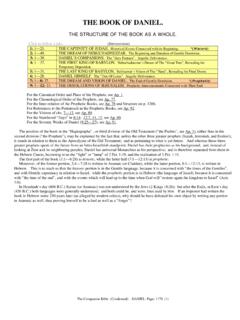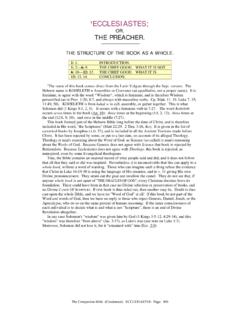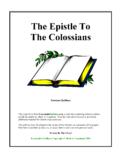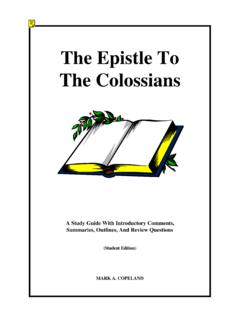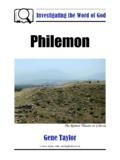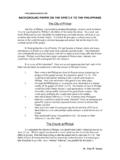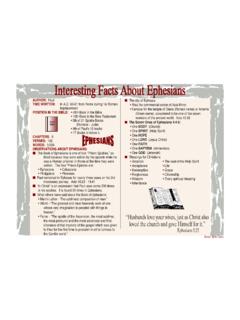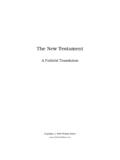Transcription of THE EPISTLE TO THE EPHESIANS. - Companion …
1 THE EPISTLE TO THE ephesians . The Companion Bible (Condensed): ephesians . Page: 1759 (1) THE STRUCTURE OF THE EPISTLE AS A WHOLE. 1:1, 2 EPISTOLARY. SALUTATION 1:3 3:19 DOCTRINAL. AS TO OUR STANDING 3:20, 21 DOXOLOGY. 4:1 6:20 DOCTRINAL. AS TO OUR STATE. 6:21 24.. EPISTOLARY. BENEDICTION. 1. ephesians is the second (see Structure, p. 1660) of the great text-books of doctrinal instruction for believers in this Dispensation. In Romans is set forth all the truth concerning the standing of the sinner in Christ, as having died and risen with Him. Now we are taken a further stage and taught that the sinner not only died and rose again in Christ, but that he is now in God s sight and purpose seated with Christ in the heavenlies.
2 Romans ends with a reference to the revelation of the Mystery (see note on the second postscript p. 1694); ephesians takes up that subject and unfolds it to us. The doctrinal part of Romans-ends with the eight chapter, a chapter on which id built the foundation of the ephesians truth. 2. The key-note is struck in the opening words, v. 3, which prove that its sphere is heavenly. In it is revealed the great secret of this Dispensation of grace, viz. that individual sinners among Jews and Gentiles are being called out and formed into the church which is His body , in which there is neither Jew nor Gentile. And that this church should be to the praise of the glory of His grace throughout eternity (2:7), and an object-lesson, so to speak, to supramundane rulers and authorities in the heavenlies (3:10), of the glorious purpose (hitherto hidden in God) of Him in heading up in one all things in this Dispensation of fullness of times (1:10), having Christ Personal as its glorified Head, and Christ Mystical, the glorified members together with Him in His Body.
3 This was the secret hid from the ages and from the generations (as Gr. of Col. 1:26) which Paul was not permitted to make known unto the sons of men (3:6) until the period of Israel s national probation was closed by the pronouncement of the decree in Acts 28:25-28 (p. 1694). But that decree once declared, he is authorized to communicate by prophetic writings the secret which had been revealed to him by the Spirit. As truly said by Chrysostom (died 407); -- these lofty thoughts and doctrines which he scarcely anywhere else utters, he here expounds. 3. The STRUCTURE of the EPISTLE as a whole (above) shows that the greater part is occupied with doctrine, one-half as it concerns our standing, and the rest as it affects our state.
4 Thus showing that sound doctrine is both the foundation and the source of right practice. 4. DATE. The EPISTLE was written from prison in Rome, probably about the end of 62, and according to Bishop Lightfoot, after the EPISTLE to Philippians. See Int. Notes to latter, and 5. The TITLE. To whom addressed? In some of the oldest MSS. the words at Ephesus (Gr. en Epheso) are not found. And the writings of some of the early Christian apologists show that these words were not in their copies, Origen (fl. 230) and Basil (fl 350). The explanation of the omission is probably that the EPISTLE was encyclical, and that the space now occupied in other of the MSS. by the words en Epheso was originally blank, so that the names of the various churches to which it was sent could be filled in.
5 From Col. 4:16 we learn that Paul wrote a letter to the Laodiceans. There can be little doubt that this is the one, as was believed by Marcion, an early Christian writer (but one much tinged by Gnosticism). If ephesians is not the letter, then an EPISTLE has been lost, which is unthinkable. Colossians was apparently a similar letter to be sent round the other churches (Col. 4:16). We conclude that (1) no EPISTLE has been lost: (2) ephesians was addressed not only to saints at Ephesus , but the other churches also, and therefore in a very special manner to us; and that (3) it comes to us as the second great text-book of believers doctrine in this Dispensation, and cannot be understood without our knowing the lessons taught by the Holy Spirit in Romans, for ephesians is built on the foundation of the doctrinal portion of Romans, ending with the eight chapter.
6 6. The City of Ephesus was one of the great commercial centers of Asia Minor, and was situated on the river Cayster, at no great distance from its mouth. Ephesus was chiefly noted, however, for the magnificent temple of Astemis (Diana), one of the wonders of the world (see Acts 19:27). The site of the city is now covered with ruins, the only inhabited part being a small Turkish village. THE EPISTLE OF PAUL THE APOSTLE TO THE ephesians . The Companion Bible (Condensed): ephesians . Page: 1760 (2) 1 PAUL, an apostle [Sent Forth] of Christ Jesus by the desire of God, to the saints which are at Ephesus, and to the faithful in Christ Jesus: 2 Grace [undeserved favour] be to you, and peace, from 1 God our Father, and from the Lord 1 Jesus Christ.
7 3 Blessed be the 1 God and 2 Father of our Lord 1 Jesus Christ, Who having blessed us with every spiritual blessing in the heavenly spheres in Christ: 4 Even as He hath chose out us in Him before the foundation of the world that we should be holy and without blame in His sight in love: 5 Having foreordained us [in love] unto the placing us as a son by 1 Jesus Christ to Himself, according to the good pleasure of His 1desire, 6 To the praise of the glory of His 2grace, which He hath made us accepted in the beloved. 7 In Whom we have the redemption through His blood, the forgiveness of transgressions, 5according to the riches of His 2grace; 8 Wherein He .. abounded toward us in all wisdom and moral insight; 9 Having made known to us the mystery of His 1desire, 5according to His 5good pleasure which He.
8 Purposed in Himself: 10 That in the dispensation of the fulness of times to sum up [for Himself] all Lord. Ap. 98. VI. i. B. 2. A. hath = having. Note the use and importance of aorist participles throughout this section. with. Ap. 104. viii. all = every. spiritual. See 1 Cor. 12. 1. blessings = blessing (sing.). Gr. eulogia. See Rom. 15. 29. heavenly places = the heavenlies, heavenly spheres. Gr. epouranios. Cp. v. 20; 2. 6; 3. 10; 6. 12. Christ. Ap. 98. IX. 4 According = Even. hath chosen = chose out.
9 Gr. eklegomai. Cp. Acts 1. 2. before. xiv. foundation. Ap. 146. world. Ap. 129. 1. Cp. 2 Tim. 1. 9. without blame. Gr. amomos. Here; 5. 27. Col. 1. 22. Heb. 9. 14. 1 Pet. 1. 19. Jude 24. Rev. 14. 5. before Him = in His sight. See 2 Cor. love. Ap. 135. II. 1. Some insert "in love" after "predestinated us" in v. 5. 5 predestinated = foreordained. Gr. proorizo. See Acts 4. 28. Rom. 8. 29. unto, to. Gr. eis. Ap. 104. vi. adoption of children.
10 Gr. huiothesia. See Rom. 8. 15. Cp. Ap. 108. iii. according to. Gr. kata. Ap. 104. good pleasure. Gr. eudokia. See Rom. 10. 1. 6 praise. See Rom. 2. 29. glory. Gr. doxa. See p. 1511. wherein. The texts read which. made .. accepted = lit. en-graced. Ap. 184. II. 2. Cp. Luke 1. 28. Beloved. Ap. 135. I. 1. Cp. Matt. 3. 17, 17. 5; &c. and see Ap. 99. 7 we have. Cp. Rom. 5. 1. redemption = the redemption. See Rom. 3. 24; 5. 1. through.
